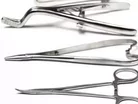Fundamental Gadgets are Vital Tools for Every Surgeon

Fundamental Gadgets are Vital Tools for Every Surgeon
Written by James Benmore
Scissors
Scissors are used for several functions throughout a surgical procedure, and available in various dissimilar shapes and scale of sharpness. Different types of scissors used in surgical procedure are:
- Utility scissors: Mainly used to incise non-biological materials, like applying and deposing bandages.Utility scissors are also used at some point in surgery to cut paper and further materials that may perhaps dull the blade of a sharper device.
- Suture scissors: Scissors for cutting suture materials when fixing or removing stitches are known as suture scissors.
- Operating or surgical scissors: They are obtainable in different sizes and are used to cut supple tissue. The cutting blades can be straight, rounded, blunt or pointed. The purpose all through the operation will decide the outline of the cutting blade.
- Dissecting scissors: These are used to take apart and discriminate tissues since they are more precise than operating scissors.
Forceps
Forceps are handheld tool used for grasping and holding objects. Different types of forceps are:
- Thumb forceps: They are surgical pincers used for grasping, squeezing, cutting, and pulling tissues.
- Clamping forceps: Clamping forceps normally recognized as hemostats are utilized to manage blood flow all through surgery. Hemostats come in diverse volumes and have locking knobs to firmly secure the cut ends of bleeding arteries and veins. Hemostats are also used to clasp tissue while surgery process.
- Needle holders: Needle holders are locking forceps that are used to embrace a suture needle when put in stitches or finishing a surgical cut.
Retractors
A retractor is amongst the apparatus which assist surgeons to restrain tissue so that they can noticeably vision the part of the body which they are operating on. Retractors can be found in various designs, sizes and shapes. The number of retractors are generally recognized with the organ which they are use to pact with. Such as:
- Gynecological instruments: Some retractors aid in keeping incisions alienated which is extremely imperative in the field of gynecology hence retractors of a particular kind come under the category of gynecological instruments.
- Abdominal retractors: Different kinds of abdominal retractors are Gelpi abdominal retractors, Balfour abdominal retractors and Kirschner abdominal retractors. They are typically made by stainless steel as this material is the toughest and one which can be untainted.
Scalpels
Scalpels are an imperative tool for performing surgical looms and tissue classifications. The diverse forms of surgical scalpels can be set into two groups:
- Reusable scalpels: Reusable scalpels by and large consist of a throwaway blade attached to a reusable handle. The blades are used only once and then disposed of.
- Disposable scalpels: Disposable surgical scalpels generally are single-piece material that usually comes with plastic handles and have retractable blades, similar to a utility knife. The whole scalpel is thrown away after just one use.
Towel Clamps
These are mainly used to secure towels and surgical draping during surgical procedure. They typically contain handles which have a lock in them. The incline of the clip can moreover be pointed or curved and some of them have teeth to offer a fine hold.
Author Bio
James Benmore has worked as a contributing editor for several books. He has also written a various articles on hospitals regarding processing and productivity development, Surgical instruments, health care, etc.
